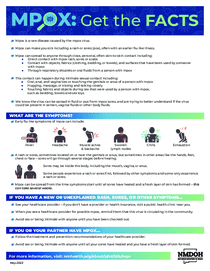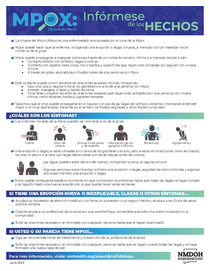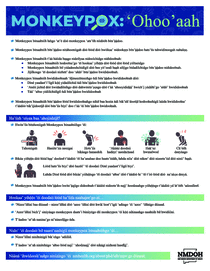
Mpox Virus
Overview
Mpox is a rare disease caused by infection with the mpox virus. It was first discovered in 1958 when there were two outbreaks of a pox-like disease in colonies of monkeys kept for research. The first human case was in 1970. Before 2022, nearly all U.S. cases were related to international travel.
Originally called “monkeypox" the disease is best known today as “mpox.” This revision is aligned with changes made by the World Health Organization Mpox proclamation and Centers for Disease Control and Prevention Mpox proclamation .

Statistics and Reports
State mpox data can be found here..
As of Jan. 10, 2024, the CDC is no longer updating mpox data. For updated case data please check Nationally Notifiable Infectious Diseases and Conditions, United States: Weekly Tables
Mpox Vaccine
CDC recommends JYNNEOS vaccine for the prevention of Mpox for people who may be at risk such as:
- People who had known or suspected exposure to someone with mpox
- People who had a sex partner in the past two weeks who was diagnosed with mpox
- Gay, bisexual, and other men who have sex with men, and transgender or nonbinary people (including adolescents who fall into any of these categories) who, in the past six months, have had:
- A new diagnosis of one or more sexually transmitted diseases (e.g., chlamydia, gonorrhea, syphilis); or
- More than one sex partner.
- People who have had any of the following in the past six months:
- Sex at a commercial sex venue; or
- Sex in association with a large public event in a geographic area where mpox transmission is occurring.
- Sex in exchange for money or other items
- People who are sexual partners of people with the above risks.
- People who anticipate experiencing any of the above scenarios.
- People with HIV infection or other causes of immunosuppression who have had recent or anticipate potential mpox exposure.
- People who work in settings where they may be exposed to mpox:
- People who work with orthopoxviruses in a laboratory
If you want to schedule your first dose - or finish the series by getting your second dose - please call one of the locations listed below to make an appointment.
If you need help scheduling a vaccine or have other questions, you can reach the New Mexico Department of Health (DOH) Helpline at 1-833-SWNURSE (1-833-796-8773)
Signs and Symptoms
Symptoms of Mpox can include:
- Fever
- Headache
- Muscle aches and backache
- Swollen lymph nodes
- Chills
- Exhaustion
- A rash that can look like pimples or blisters that appears on the face, inside the mouth, and on other parts of the body, like the hands, feet, chest, genitals or anus.
The rash goes through different stages before healing completely. The illness typically lasts 2-4 weeks.
Sometimes, people get a rash first, followed by other symptoms. Others only experience a rash.
Mpox can look like a lot of other diseases, such as syphilis. You can find free syphilis and other STD testing here: HIV Hepatitis STD Online Resource Guide
What Do I Do If I Think I Might Have Been Exposed
If you haven’t been vaccinated with Jynneos, getting vaccinated quickly after exposure can prevent mpox. You should seek medical guidance from your health care provider or call the DOH Helpline at 1-833-SWNURSE (1-833-796-8773) if you:
- Had contact with someone who had a rash that looks like Mpox or someone who was diagnosed with confirmed or probable Mpox
- Had skin-to-skin contact with someone in a social network experiencing Mpox activity, sexually active individuals who meet partners through an online website, digital application (“app”), or social event (e.g., a bar or party)
- Traveled outside the US to a country with confirmed cases of Mpox or where Mpox activity has been ongoing
What should a person do if they have a new or unexplained rash, sores, or other symptoms?
- Avoid sex or being intimate with anyone until you have been checked out by a healthcare provider. If you don’t have a provider or health insurance, visit a public health clinic near you.
- When you see a healthcare provider, remind them that there are still mpox cases in the U.S.
- Avoid gatherings, especially if they involve close, personal, skin-to-skin contact.
- Do not share items that touched the rash or lesions (e.g., bed linens, clothing, towels, wash cloths). Do not share drinking glasses or eating utensils.
- Think about the people you have had close, personal, or sexual contact within the last 21 days, including people you met through dating apps. You might be asked to share this information if you have received a Mpox diagnosis, to help stop the spread.
You can learn more on this page from the CDC: CDC - Mpox Signs & Symptoms
News
- Op-Ed-Monkeypox: What is it? Am I at risk? Who should get vaccinated? How can we stop the spread?
- Department of Health reports probable monkeypox case in state
Infographics




